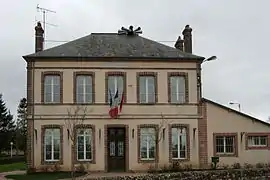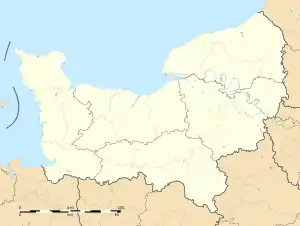Ablon | |
|---|---|
 Ablon Town Hall | |
Location of Ablon | |
 Ablon  Ablon | |
| Coordinates: 49°23′39″N 0°17′48″E / 49.3942°N 0.2967°E | |
| Country | France |
| Region | Normandy |
| Department | Calvados |
| Arrondissement | Lisieux |
| Canton | Honfleur-Deauville |
| Intercommunality | Pays de Honfleur-Beuzeville |
| Government | |
| • Mayor (2020–2026) | Xavier Canu[1] |
| Area 1 | 12 km2 (5 sq mi) |
| Population | 1,187 |
| • Density | 99/km2 (260/sq mi) |
| Demonym(s) | Ablonnais, Ablonnaises |
| Time zone | UTC+01:00 (CET) |
| • Summer (DST) | UTC+02:00 (CEST) |
| INSEE/Postal code | 14001 /14600 |
| Elevation | 0–118 m (0–387 ft) (avg. 98 m or 322 ft) |
| 1 French Land Register data, which excludes lakes, ponds, glaciers > 1 km2 (0.386 sq mi or 247 acres) and river estuaries. | |
Ablon (French pronunciation: [ablɔ̃] ⓘ) is a commune in the Calvados department in the Normandy region in northwestern France.
Geography
Ablon is 5 km south east of Honfleur and 16 km north-west of Pont-Audemer with its northern border on the Seine Estuary. It can be reached on Highway D580A from Honfleur turning right on the small country road called Cote de Vats to reach the village of Ablon. Road D140 (Route de Genneville) from Genneville in the south passes through the western side of the commune to join the D580a just outside the commune. The D144 road forms the southern border of the commune. Ablon is in the north-eastern corner of the Calvados department with its eastern border being the departmental border with Eure.[3]
The Morelle river passes through the north of the commune from east to west although oddly does not form part of the commune. The Canal de Retour is parallel to it but also does not form part of the commune.[3]
Toponymy
The name of the village is attested as far back as 1180 as Abelon.
One theory states that the town's name comes from the Norse Epi-lundr, meaning “apple orchard”. The nearby village of Yébleron shares this etymology. The ancient scandinavian lundr meaning orchard or wood has regularly been followed by the suffix -lon (for example, Bouquelon, Écaquelon, Yquelon, etc.).
Another theory suggests that the town's name derives from the Germanic personal name Abilo, followed by the suffix -o/-one, but this suffix does not usually accompany Germanic personal names. It has also been suggested that the name is based solely on the name ‘Abilo' with no suffix but the usage of a personal name with no suffix or epithet would be exceptional among Norman place names.
A third theory suggests that Ablon comes from the Germanic personal name Abbo followed by the suffix -lon. If this is the case the name of the town means “Abbo's wood”.
The similarity with the nearby village of Ablon-sur-Seine is coincidental.[4]
History
In 1809, Ablon grew in size following its union with two neighbouring communes: Crémanville and Ableville.[5]
Ablon was the site of a Nobel dynamite factory from 1879 until 1989.![]() [6] The factory ceased operations following an explosion on 3 March 1988 which killed 5, including the factory's director, and left 8 injured. Windows were broken more than a kilometre away in the village of Honfleur.[7][8]
[6] The factory ceased operations following an explosion on 3 March 1988 which killed 5, including the factory's director, and left 8 injured. Windows were broken more than a kilometre away in the village of Honfleur.[7][8]
Administration
List of Successive Mayors of Ablon[9]
| From | To | Name | Party |
|---|---|---|---|
| 2001 | 2008 | Christian Trocque | UMP |
| 2008 | Current | Xavier Canu | DVD |
Population
The inhabitants of the commune are known as Ablonnais or Ablonnaises.[10]
|
| ||||||||||||||||||||||||||||||||||||||||||||||||||||||||||||||||||||||||||||||||||||||||||||||||||||||||||||||||||
| Source: EHESS (1793-1999)[5] and INSEE[11] | |||||||||||||||||||||||||||||||||||||||||||||||||||||||||||||||||||||||||||||||||||||||||||||||||||||||||||||||||||
Culture and heritage
Civil heritage
The commune has two buildings that are registered as historical monuments:
- The Chateau of Ablon (1767 and 1845)
 [12]
[12] - The Dynamite Factory (1885 to 1916).
 [6] The factory contains several items that are registered as historical objects:
[6] The factory contains several items that are registered as historical objects:
- Other sites of interest
- La Houssaye Manor-farm
Religious heritage

The Parish Church of Saint-Pierre contains one item that is registered as an historical object:
- A Baptismal font (12th century)
 [16]
[16]
See also
References
- ↑ "Répertoire national des élus: les maires" (in French). data.gouv.fr, Plateforme ouverte des données publiques françaises. 13 September 2022.
- ↑ "Populations légales 2021". The National Institute of Statistics and Economic Studies. 28 December 2023.
- 1 2 3 Google Maps
- ↑ Ernest Nègre, Toponymie générale de la France, Droz, Genève, Ch. IV, p. 825, no 14261
- 1 2 Des villages de Cassini aux communes d'aujourd'hui: Commune data sheet Ablon, EHESS (in French).
- 1 2 Ministry of Culture, Mérimée IA14000758 Dynamite Factory (in French)

- ↑ Record of Accident on the A.R.I.A. database
- ↑ Detailed Record of Accident on the A.R.I.A. database
- ↑ List of Mayors of France (in French)
- ↑ Inhabitants of Calvados (in French)
- ↑ Population en historique depuis 1968, INSEE
- ↑ Ministry of Culture, Mérimée PA00111828 Chateau of Ablon (in French)
- ↑ Ministry of Culture, Palissy IM14002731 Dreiswerke moulding machine (in French)

- ↑ Ministry of Culture, Palissy IM14002730 Weighing machine (in French)

- ↑ Ministry of Culture, Palissy IM14002729 Nitroglycerine production line (in French)

- ↑ Ministry of Culture, Palissy PM14000001 Baptismal font (in French)
External links
- Ablon official website (in French)
- Ablon on the old IGN website (in French)
- Ablon on Géoportail, National Geographic Institute (IGN) website (in French)
- Ablon on the 1750 Cassini Map